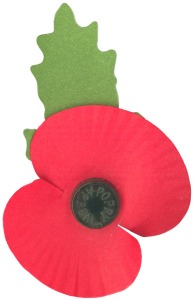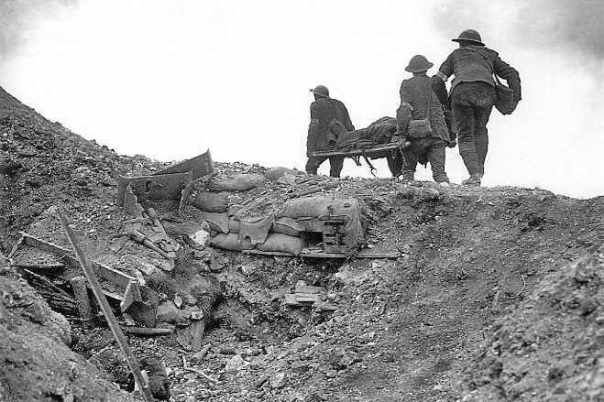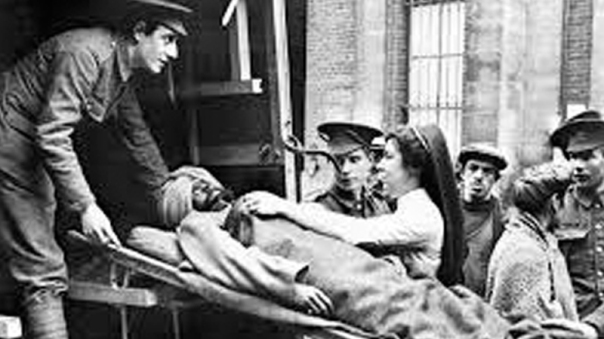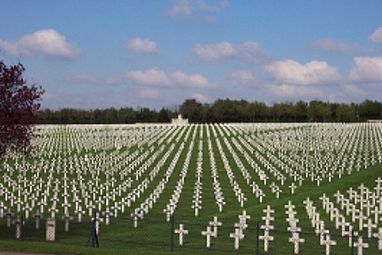
Remembrance Poppy
My maternal grandfather was a proud man who refused to wear a tie or to bow to anybody or anything. But Mum said that he made one exception, at 11:11 am every Armistice Day, when he stood stiffly to attention—as did everyone else in the room, or woe betide them—during the minute of silence on the radio in honour of all who lost their lives in the First World War.
My uncle Ted told me that Granddad signed up with his younger brother at the start of the War. The pressure to enlist was enormous, and there was no work for them in England, so off they went to France. Granddad made it through with only a knee injury that sent him to a hospital in Wales for a short period of recovery and then back to the front, where he was transferred from the King’s Royal Rifle Corps Regiment to a “cushy” job in the Royal Army Medical Corps, retrieving the wounded and the dead from the field of battle. He served to the very end and came home in one piece, but his brother wasn’t so lucky. He was killed in the very last month of the war, and the family has never found his grave.
The demobilized soldiers were promised “a land fit for heroes,” but the reality back home was very different. During the four years of the war our grandmother had given birth to three children and buried two of them. Life was bleak for the young couple, with more children being born and no work to be found. Granddad faced a Catch-22 whereby he couldn’t receive unemployment because he had not lost a job; apparently the war didn’t count. As a small boy, Uncle Ted remembers queuing up with his father for food relief and coming away with a single loaf of bread to feed the whole family.
Although Granddad himself remained staunchly patriotic and proud of his military service, Uncle Ted is sad and bitter on his behalf. He blames the diplomats who failed to secure a negotiated peace, the generals who sent soldiers to certain slaughter, and the politicians who allowed the war to drag on for years, long after anyone remembered what it was all in aid of—if they ever had.
It was in my childhood that I first wore a poppy on Remembrance Day in remembrance of the dead of the “Great War”—the war in which there was hardly a family in Britain who didn’t lose someone. But this year the controversy surrounding that simple emblem has left a bad taste in my mouth. Right-wing anti-immigrant parties have attempted to appropriate the remembrance poppy and its meaning. It was always sold by the Royal British Legion in aid of the WWI veterans; now, however, there are hardly any of them left and apparently groups like Britain First have been selling the poppy as well; I wonder what they do with the money.
I am not living in Britain, but the controversy reaches me over Facebook, where I have been seeing aggressive posts telling those who disrespect the poppy to Go Home. After a little research into the subject, I find that the so-called disrespecters are straw men: that is, no one has shown disrespect to the poppy and what it stands for; these groups are creating a false enemy in order to fan the flames of hate. It would be well for these haters to remember that among the many men who fought and died in the First World War were nearly two million British colonial subjects, Indians and Africans who were aggressively recruited, with promises of land and freedom upon their return. For those who did return, the promises were not kept, fueling the movements for independence from colonial rule.
So on Remembrance Day, once but no longer Poppy Day in my mind, I remember the hard lives of my grandparents and the ordinary British working people, as well as the men who gave their lives for their colonial rulers. That war was not fought for any of them. If the poppy means anything to me, it is as an emblem of the fragility and preciousness of human life and a reminder of all those who have been sacrificed to the insatiably hungry war machine.




Good post. It’s interesting the diversity of feeling around the poppy and its co-option by politicians for assorted purposes. My family was affected by both world wars – my parents lost a father, a cousin, and a brother. They lived through both wars and served in WW2. Neither ever bought nor wore a poppy. I have the sense this was a very conscious decision – driven in part by a dislike of political – and particularly Conservative – exploitation of such symbols. The Union Jack was another.
LikeLiked by 1 person
Thank you for this comment, Josie. I think people may forget the devastating human toll of the First World War, which cast its dark shadow over the entire 20th century. Your parents’ refusal to engage in poppy-flaunting and flag-waving reinforces my sense that the people who have actually suffered through war are the least likely to glorify it. -J
LikeLiked by 1 person
Thank you, Josna, for the reminder that War is horror and taints all of our hearts and souls. Please, humanity, learn to work together to solve our differences. “War is not the answer.”
LikeLiked by 1 person
Thank you, Anna. It’s so often those who don’t actually do the fighting who glorify war. Love, J
LikeLike
Reblogged this on Tell Me Another and commented:
On Remembrance Day, sharing this post from the TMA archives in memory of my maternal grandparents, of my great-uncle whom I never met, and of the many, many lives lost or ruined forever due to that war, due to all wars.
LikeLike
Sad how as a human race we don’t seem to learn about the horrors of war.
I remember last year for Remembrance Day I had written about my trip to Normandy. The village of Ste Mere Elise hasn’t forgotten the day the Americans came in out of the sky and standing on Omaha Beach looking at the total lack of shelter was an experience that hushed even my usually very chatty younger son.
My oldest brother-in-law was a paratrooper in the Indian Army and was captured during the 1965 war. He never told us details and wouldn’t talk about the wars he was in. I remember he could not sit still for too long. He needed to pace up and down the room, in the manner of a caged lion.
LikeLiked by 1 person
Great reflection. You show clearly how deeper meaning is lost when the story is separated from history.
LikeLiked by 1 person
A powerful post. My grandfather also ended up in France in WWI and as a conscientious objector ended up carrying supplies to the troops in the trenches.
Interesting about the furor over the poppy and using strawman tactics to turn people against immigrants. I see similar divisive issues being raised in the U.S.
LikeLiked by 1 person
Josna, This was beautiful and wrenching. Both my grandfathers were in the war, both came home, and both died young–one with TB exacerbated by lungs damaged by gas, and the other of some brain disease, raving, tied to a bed in his early 30s. I love the image of your grandfather standing at attention. Each war brings new horrors, but I don’t think much has topped the grueling horrors of trench warfare. I’ve never forgotten how overwhelmed I was when I visited Verdun while in high school in Belgium. Where is the cemetery in the picture? I didn’t know how many Indian and Africans were in the war. Thanks for giving us that number. I haven’t heard about the poppy thing here. The vets still stand outside supermarkets and give them away for donations. I still like buying them, but I will now think of your image of the fragility of human life.
LikeLiked by 1 person
Dear Maureen, thank you. I had hoped you would appreciate this. So sorry about your grandfathers. terrible, what that war did to so many. My mother’s maternal uncle came home with shell shock and never recovered. He lived with his mother, didn’t marry, and was terribly nervous. My mother told me that he couldn’t cross an open room; too reminiscent of venturing out from the trenches into No Man’s Land. I have always liked the poppies, too, but now their meaning in Britain has been tainted. x J
LikeLike